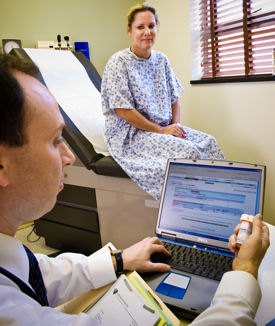Update ICD-9 coding materials now to meet October deadline
Every summer, the CDC's National Center for Health Statistics announces changes to the ICD-9-CM and the new codes go into effect Oct. 1.
Every summer, the CDC's National Center for Health Statistics announces changes to the ICD-9-CM and the new codes go into effect Oct. 1. In the past, CMS allowed physicians to use both the old and new diagnosis codes for the first three months of implementation, but that has not been the case for a number of years. Physicians must now discontinue use of deleted codes and begin using new codes every October. Many private insurers follow the same rules, so it is best to update your ICD-9 coding material this month.
Q: What changes have the biggest impact on internists?
A: There were several hundred changes to the ICD-9 codes for this year. Many of the codes are not commonly used by most general internists.
Still, it is important to remember that physicians are required to use the most specific code or codes possible when assigning diagnoses on a claim form. ICD-9 codes are used to determine appropriate payment for services and make coverage decisions, and they can be an important tracking tool for public health statistics. ICD-9 code assignment is also important for physicians who plan to participate in Medicare's Physician Quality Reporting Initiative (PQRI), because the diagnosis determines which patients would require quality reporting codes.
The following changes will go into effect on Oct. 1. The first sections are codes that were deleted in favor of more specific five-digit ICD-9-CM codes.
Deleted 599.7 Hematuria
Replaced with 599.70 Hematuria, unspecified 599.71 Gross hematuria 599.72 Microscopic hematuria
Deleted 780.6 Fever
Replaced with 780.60 Fever, unspecified 780.61 Fever presenting with conditions classified elsewhere 780.62 Postprocedural fever 780.63 Postvaccination fever 780.64 Chills (without fever) 780.65 Hypothermia not associated with low environmental temperature
As usual, a long list of ICD-9 diagnosis codes has been added. Codes common to internal medicine include:
038.12 Methicillin-resistant Staphylococcus aureus septicemia 078.12 Plantar wart 339.00 Cluster headache syndrome, unspecified 339.01 Episodic cluster headache 339.02 Chronic cluster headache 339.03 Episodic paroxysmal hemicrania 339.04 Chronic paroxysmal hemicrania 339.05 Short lasting unilateral neuralgiform headache with conjunctival injection and tearing 339.10 Tension type headache, unspecified 339.11 Episodic tension type headache 339.12 Chronic tension type headache 339.20 Post-traumatic headache, unspecified 339.21 Acute post-traumatic headache 339.22 Chronic post-traumatic headache 339.41 Hemicrania continua 339.42 New daily persistent headache
The complete list of codes is too long to include in this column. A significant number of codes were added in the area of leukemia (204.xx), carcinoid tumors (209.xx), secondary diabetes mellitus (249.xx), migraine (346.xx), erythema (695.xx), and other areas.
The full list of added, deleted, and revised codes can be found online.
Q: Can I bill Medicare for diabetes self-management training?
A: Yes, but there are restrictions on when diabetes self-management training (DSMT), is a covered service. First, the provider must be accredited to perform DSMT under the standards of a recognized national organization, such as the American Diabetes Association. Of course, this service is restricted to patients with diabetes.
The DSMT must be ordered by a physician and up to 10 hours of initial training the patient receives may be covered by Medicare.
Self-management as defined by Medicare includes instructions in self-monitoring of blood glucose; education about diet and exercise; an insulin treatment plan developed specifically for the patient who is insulin-dependent; and motivation for patients to use the skills for self-management.



